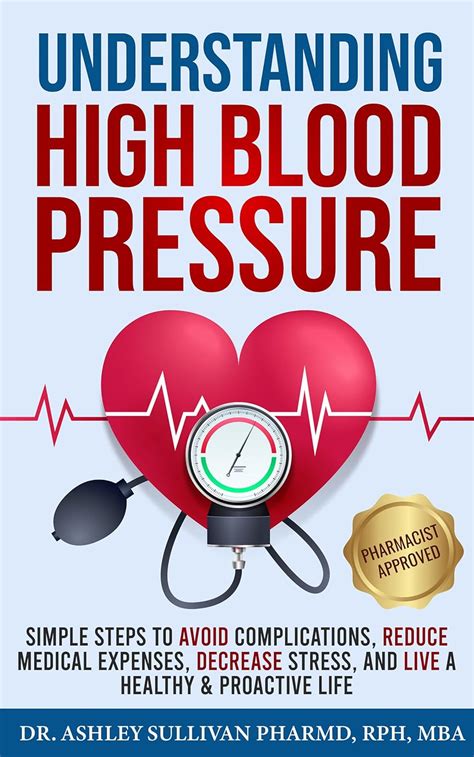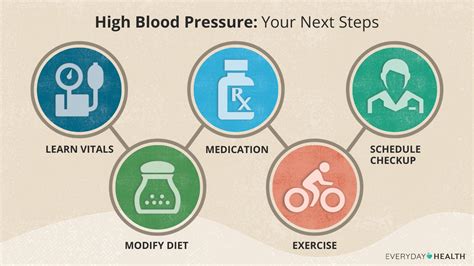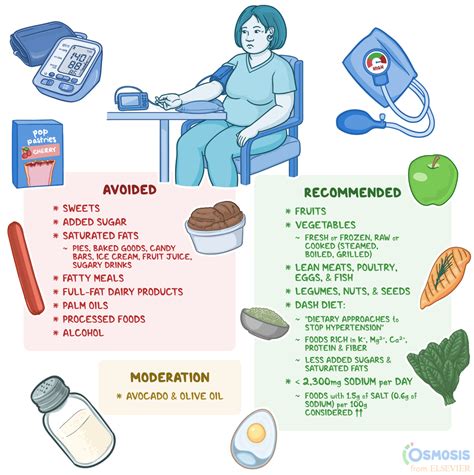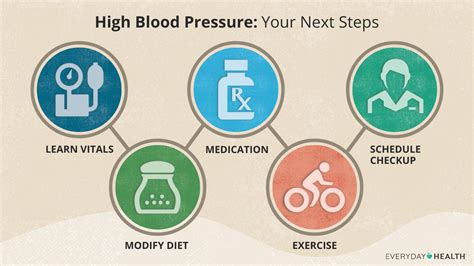Intro
Discover 5 effective ways to manage high blood pressure, including lifestyle changes, diet modifications, and stress reduction techniques to control hypertension and improve overall cardiovascular health.
High blood pressure, also known as hypertension, is a common health condition that affects millions of people worldwide. It is a major risk factor for heart disease, stroke, and kidney disease, making it essential to manage and control. Managing high blood pressure requires a combination of lifestyle changes, dietary modifications, and medical treatment. In this article, we will explore five ways to manage high blood pressure, including lifestyle changes, dietary modifications, stress management, monitoring, and medical treatment.
High blood pressure is a serious health condition that can have severe consequences if left unmanaged. It can cause damage to the blood vessels, heart, and kidneys, leading to heart failure, stroke, and kidney disease. Therefore, it is crucial to take proactive steps to manage and control high blood pressure. By making lifestyle changes, dietary modifications, and seeking medical treatment, individuals can reduce their risk of developing complications and improve their overall health.
The importance of managing high blood pressure cannot be overstated. Uncontrolled high blood pressure can lead to severe health consequences, including heart attack, stroke, and kidney failure. Furthermore, high blood pressure can also increase the risk of developing other health conditions, such as diabetes, cardiovascular disease, and certain types of cancer. By managing high blood pressure, individuals can reduce their risk of developing these conditions and improve their overall health and well-being.
Understanding High Blood Pressure

Risk Factors for High Blood Pressure
Several risk factors contribute to the development of high blood pressure, including age, family history, obesity, physical inactivity, smoking, and certain medical conditions. Individuals with a family history of high blood pressure are more likely to develop the condition, as are those who are overweight or obese. Physical inactivity, smoking, and certain medical conditions, such as kidney disease and sleep apnea, can also increase the risk of developing high blood pressure.Lifestyle Changes for Managing High Blood Pressure

Benefits of Lifestyle Changes
Lifestyle changes can have numerous benefits for individuals with high blood pressure. These changes can help reduce blood pressure, improve overall health, and reduce the risk of complications. Some benefits of lifestyle changes include: * Lower blood pressure: Lifestyle changes can help reduce blood pressure and improve overall health. * Improved overall health: Lifestyle changes can help improve overall health and reduce the risk of complications. * Reduced risk of complications: Lifestyle changes can help reduce the risk of complications, such as heart attack, stroke, and kidney failure. * Improved quality of life: Lifestyle changes can help improve quality of life and reduce the risk of disability.Dietary Modifications for Managing High Blood Pressure

Benefits of Dietary Modifications
Dietary modifications can have numerous benefits for individuals with high blood pressure. These modifications can help reduce blood pressure, improve overall health, and reduce the risk of complications. Some benefits of dietary modifications include: * Lower blood pressure: Dietary modifications can help reduce blood pressure and improve overall health. * Improved overall health: Dietary modifications can help improve overall health and reduce the risk of complications. * Reduced risk of complications: Dietary modifications can help reduce the risk of complications, such as heart attack, stroke, and kidney failure. * Improved quality of life: Dietary modifications can help improve quality of life and reduce the risk of disability.Stress Management for Managing High Blood Pressure

Benefits of Stress Management
Stress management can have numerous benefits for individuals with high blood pressure. These techniques can help reduce stress, lower blood pressure, and improve overall health. Some benefits of stress management include: * Lower blood pressure: Stress management can help reduce blood pressure and improve overall health. * Improved overall health: Stress management can help improve overall health and reduce the risk of complications. * Reduced risk of complications: Stress management can help reduce the risk of complications, such as heart attack, stroke, and kidney failure. * Improved quality of life: Stress management can help improve quality of life and reduce the risk of disability.Monitoring Blood Pressure

Importance of Monitoring Blood Pressure
Monitoring blood pressure is essential for managing high blood pressure. Regular blood pressure monitoring can help individuals track their blood pressure and make adjustments to their lifestyle and treatment plan as needed. Some importance of monitoring blood pressure include: * Tracking blood pressure: Monitoring blood pressure can help individuals track their blood pressure and identify patterns and trends. * Making adjustments: Monitoring blood pressure can help individuals make adjustments to their lifestyle and treatment plan as needed. * Reducing risk of complications: Monitoring blood pressure can help reduce the risk of complications, such as heart attack, stroke, and kidney failure.Medical Treatment for Managing High Blood Pressure

Benefits of Medical Treatment
Medical treatment can have numerous benefits for individuals with high blood pressure. These treatments can help lower blood pressure, reduce the risk of complications, and improve overall health. Some benefits of medical treatment include: * Lower blood pressure: Medical treatment can help reduce blood pressure and improve overall health. * Reduced risk of complications: Medical treatment can help reduce the risk of complications, such as heart attack, stroke, and kidney failure. * Improved overall health: Medical treatment can help improve overall health and reduce the risk of disability. * Improved quality of life: Medical treatment can help improve quality of life and reduce the risk of disability.What are the symptoms of high blood pressure?
+High blood pressure often has no symptoms, but it can cause headaches, dizziness, and nosebleeds in some individuals.
How can I lower my blood pressure?
+Lifestyle changes, such as regular exercise, weight loss, and stress management, can help lower blood pressure. Dietary modifications, such as reducing sodium intake and increasing potassium intake, can also help.
What are the risks of uncontrolled high blood pressure?
+Uncontrolled high blood pressure can increase the risk of heart attack, stroke, and kidney failure. It can also cause damage to the blood vessels, heart, and kidneys, leading to disability and death.
How often should I monitor my blood pressure?
+Individuals with high blood pressure should monitor their blood pressure regularly, ideally daily, to track their blood pressure and make adjustments to their lifestyle and treatment plan as needed.
What are the benefits of managing high blood pressure?
+Managing high blood pressure can help reduce the risk of complications, such as heart attack, stroke, and kidney failure. It can also improve overall health, reduce the risk of disability, and improve quality of life.
In conclusion, managing high blood pressure requires a combination of lifestyle changes, dietary modifications, stress management, monitoring, and medical treatment. By making these changes and seeking medical treatment, individuals can reduce their risk of developing complications and improve their overall health and well-being. We encourage readers to share their experiences and tips for managing high blood pressure in the comments below. Additionally, we invite readers to share this article with others who may be struggling with high blood pressure, and to take the first step towards a healthier and happier life by making positive changes to their lifestyle and treatment plan.
